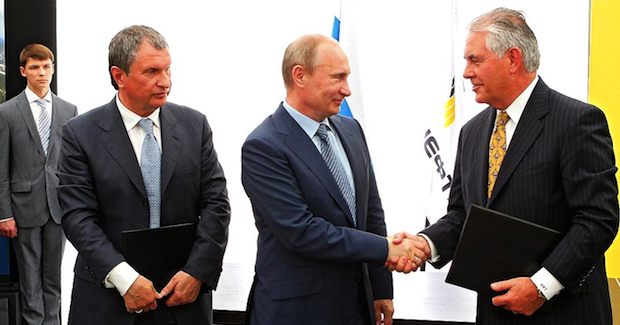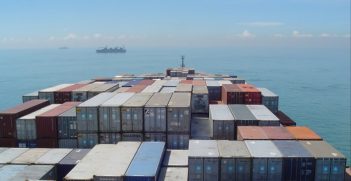From Quasi-State to State Department: Rex Tillerson

The chief executive of one of the world’s largest companies has been nominated to fill the United States’ oldest cabinet position. Rex Tillerson, head of ExxonMobil, would be the first secretary of state in modern history with no public sector experience. Nonetheless, this appointment is consistent with the Trump administration’s focus on hiring deal-makers to enact shifts in US policy at home and overseas.
In defending the proposed appointment, which is subject to Senate confirmation, Trump described Tillerson as a “world-class player”. Supporters point to his 40 years of experience in one of the most profitable companies in the world. ExxonMobil operates globally, exploring for oil and gas on six continents. Close to 70 per cent of its profits and sales come from operations outside the United States. However, ExxonMobil isn’t just any company. It’s a behemoth, its size rendering it larger than the GDP of most countries. It has a geopolitical gravity of its own, and a foreign policy that has at times been directly at odds with US policy. The former CEO, Lee Raymond, once declared “I’m not a US company and I don’t make decisions based on what’s good for the US”. When Rex Tillerson himself flouted Bush’s State Department policy in order to cut an independent deal with the Kurdish regional government, Tillerson explained that “I had to do what was best for my shareholders”.
The State Department does not have shareholders. Its mandate is not to boost dividends but US national interests. The list of responsibilities is long: to foster and maintain alliances, to provide political and economic expertise on every country and region on earth, to maintain hundreds of diplomatic missions overseas, to develop trade ties and provide consular services, to deliver aid and development programs. For this global purview, it has nothing of the financial and litigation muscle of Tillerson’s employer, and a fraction of the US Defence Department whose budget covers that same geographic purview. In 2015 the US State Department budget was US$65 billion (A$87 billion), while the US Defence Department was US$523 billion (by way of crude comparison, Exxon Mobil’s annual revenue in 2015 was US$246 billion).
Crucially the State Department is the US agency tasked with leading negotiations on international climate change agreements. Trump has famously called climate change a “Chinese conspiracy to undermine American manufacturing”, while President Obama pledged the US to phase out fossil fuel subsidies by 2020. It is unclear where Tillerson falls on this issue. Although he has expressed support for a carbon tax and the Paris Agreement, financial records of the company under his leadership paint a different picture. The American Geophysical Union which is comprised of scientists and engineers, asserted early this year that “ExxonMobil is a leading sponsor of think tanks, advocacy groups and trade associations that promote climate science misinformation”, despite publicly pledging to end this corporate support in 2007.
Despite these issues, the business executive comes highly recommended to the position of secretary of state by a former occupant of the post, Condoleezza Rice. Steve Coll, who wrote a book on ExxonMobil called ‘Private Empire’, notes that “Compared to the records of some of the other people around Trump, Tillerson’s is at least one of professional integrity; Exxon is a ruthless and unusually aggressive corporation, but it is also rule-bound.” In public profiles Tillerson is often linked to that most quintessential of American institutions (and itself a byword for wholesomeness)—Tillerson is literally a boy scout.
Tillerson’s close ties to Russia are a matter of concern for his confirmation, however. Russia has recently been implicated by high-ranking US military and intelligence personnel in attempting to sway the US election. Tillerson received the Order of Friendship from Putin in 2013 after negotiating lucrative deals to explore the Russian Arctic. Currently, oil and gas rents contribute over half of Russia’s revenue. Valuable exploration and extraction projects are currently on hold, however, due to Western sanctions enacted in 2014 following Russia’s annexation of Crimea. Sanctions were continued after Russia sent tanks into eastern Ukraine. In the middle of these incidents, Russia was implicated in the downing of the passenger flight Malaysia Airlines Flight 17 by Russian-separatists in Ukraine. Crucially, as part of the sanctions, Russia is barred from accessing advanced offshore and shale oil technology, which is damaging to Moscow’s longer-term economic security as oil hovers around $50/barrel. As secretary of state, Tillerson could lobby for the lifting of these sanctions, a tool of statecraft he has called “ineffective”.
As a nominee, Tillerson would need to convince the Senate that he can separate himself from the only employer he has ever known, and from foreign entanglements that could call into question his objectivity. Chairman of the Senate Armed Services Committee, John McCain said in an interview with Fox News, “I don’t know what Mr. Tillerson’s relationship with Vladimir Putin was, but I’ll tell you it is a matter of concern to me…Vladimir Putin is a thug, a bully and a murderer, and anybody else who describes him as anything else is lying.” Tillerson can be expected to face questions about Russia’s role in Syria and other global conflicts as part of the confirmation process.
As secretary of state, Tillerson will need to adapt quickly from purely pecuniary concerns to a wider purview of American interests. International business experience, whether in real estate or hydrocarbons is not always directly applicable to complex statecraft. Indeed, as senior GOP national security advisors recently noted in a letter to Trump, “there is no recourse to bankruptcy court in international affairs.” With an incoming administration largely inexperienced in international diplomacy, the role of the State Department will be particularly important. As now-outgoing Secretary of State John Kerry noted in 2013, the State Department represents an investment in which “diplomacy and development help prevent wars, reduce the threat of nuclear weapons, secure our borders and protect Americans abroad.” This is particularly crucial in a Trump administration, for the secretary of state will likely be the one tasked with cleaning up the diplomatic rows begun via tweet. By way of job preparation, Tillerson should start divesting himself of compromising foreign and financial ties. He should also probably sign up to Twitter.
Dr Jennifer S. Hunt specialises in international security with a focus on the intersection of national security, economic and energy security issues. She is a lecturer in the National Security College at the ANU.
This article is published under a Creative Commons Licence and may be republished with attribution.





